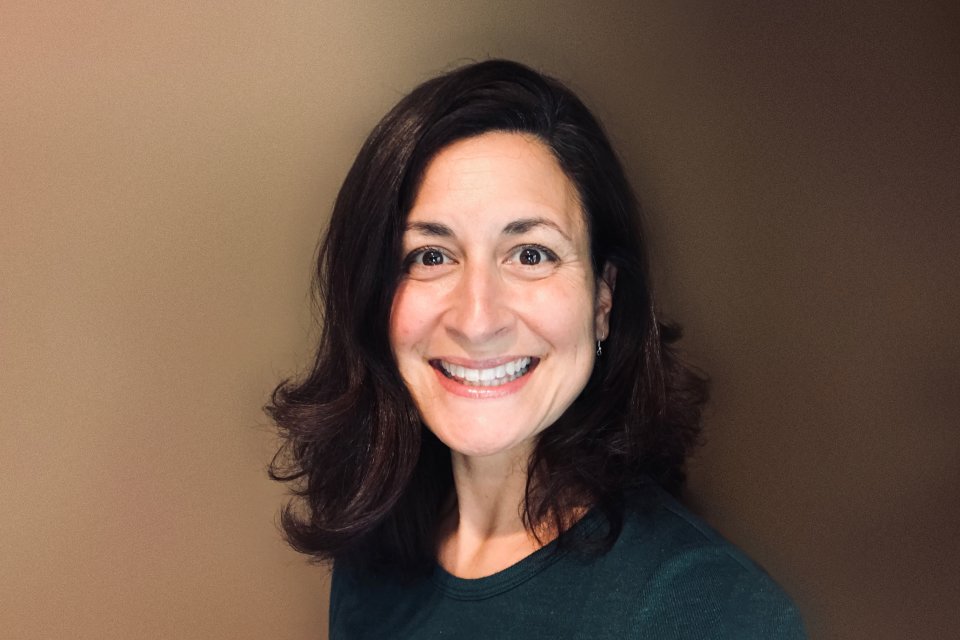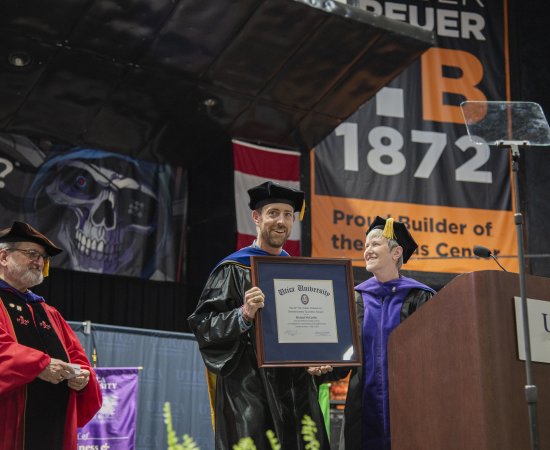
The Architect of Online Learning

“The energy everyone has collectively put toward this effort of remote learning and teaching is what sustains us.”
As UC moves all academic instruction online in response to the coronavirus pandemic, the transition from life face-to-face to existing in the digital space requires quick thinking from instructional designers like Katie Hanifin. She talked to Utica about making the shift—and why UC has a “leg up” in the online department.
Utica Magazine: How are you doing, the circumstances being what they are?
Katie Hanifin: Growing up, my father always would say, ‘You don’t have to look very far to find somebody who’s got it a lot worse than you.

UM: That’s great perspective. Your father was spot on. Over the past several weeks, colleges and universities all across the country have had to face a daunting task in an even more daunting timeline, that being the challenge of moving academic delivery fully online. In many ways, instructional designers have always been unsung heroes, in that your work occurs behind the scenes. How would you describe your role and the work you do?
KH: That’s a big question. A really good teaching technique is story-telling, so I’ll try it that way. Imagine you possess a giant toolbox of wonderful, paradigm-changing teaching tools that you love to share with anybody that will listen. That’s basically the role of the instructional designer, to share these new and different things you can do in your teaching. What has happened in the current situation is that we’re forced to do it with an unforeseen urgency that is obviously less than ideal. I’ve been working with a much greater volume of people, but the work has not changed because it’s just people talking about their teaching, talking about different ways of doing it, learning how to do it better and, despite the unfortunate circumstances, there’s a palpable energy of excitement and newness that’s coming from people being forced to embrace things that they maybe didn’t know existed.
UM: You talk about urgency – this unimaginable sense of urgency that we’re all in the midst of. For you and your colleagues that meant working with faculty to transition hundreds of courses to the virtual environment in a matter of a week or two. What did that process look and feel like?
KH:(Laughing) Okay, here’s the deal. I’ve always used the joke, ‘There’s no such thing as an instructional design emergency.’ Well, this was an emergency.
The response has been working very long days. You have to get a lot of people up to speed quickly. Not all of our instructors are full-time instructors. You have to be willing to meet people when they have the time to look at the courses that they’re teaching. So it’s early in the morning, late at night, all day long, and you have to vary the response. You have to triage a little bit and think to yourself, “What are the things that I need to say to everybody, and what are the things that require one-on-one consultation?” But I’d be lying if I said it hasn’t been basically around the clock for two and a half weeks.
UM: You’ve suggested many, if not most, of the instructors you’ve been working with have embraced these new means and methods of delivering their content. Can you talk about that?
KH: They absolutely have – 100 percent. People I have worked with, across the board, have risen to the challenge, and the energy everyone has collectively put toward this effort of remote learning and teaching is what sustains us. I mean, they may come into a conversation feeling very unsure, very uncertain, they don’t know what their capabilities are, but almost unilaterally they walk away saying, ‘I’m excited. We can do this.’ There’s great energy around this effort.
UM: While Utica College has many faculty who regularly teach in the online environment, there are also many faculty members who have taught exclusively in the face-to-face setting and have done so very effectively for a long period of time. From your perspective, how has this adjustment gone?
KH: We have worked with veteran faculty in a capacity where they’ve learned to look at their approaches differently. One of the biggest things that you tackle in bridging a physical classroom environment to an online environment is your use of time. The classroom environment demands that we sit together in a room for a set amount of time. The remote learning environment opens that up so that students can consume a lot of information at a time and a pace that works for them. You’re not confined to the class schedule, and that forces us to think about how we maximize that time differently. I may not need to record an hour and a half lecture. I may need to break that down into more sizable chunks so that my students are logging in when they have a moment and doing this piece, and then logging in again and doing a couple more things. Even just that type of reorganization is a big leap for a lot of people, especially when you’ve done it one way – that face-to-face time they’ve spent with students – and done it so well, for a long period of time.
UM: You’ve been engaged in this work for a long time, and Utica College has obviously been teaching in an online format for a long time. Is it fair to suggest that this shift or transition to exclusively remote learning, in many ways, hasn’t been a transition for people here to the extent that it has been for those at other institutions who were starting from scratch? To what extent has that maybe given Utica College a leg up compared to other institutions during these difficult times?
KH: I think Utica College, very sincerely, has a wonderful leg up on this because we have faculty who have felt very little transition. We have faculty who haven’t reached out to us in any capacity because they knew exactly what to do and how to do it. We also have faculty who are relying on one another and faculty acting as champions in how to do this successfully, and that’s huge. We couldn’t be where we are right now without those faculty playing the role that they’ve always played and sharing that confidence with the ones who maybe haven’t.
UM: You’ve had the additional challenge of helping and guiding faculty on how to teach remotely while faculty and staff were, themselves, working and interacting remotely. You haven’t had faculty members walking into your office as they normally do.
KH: You’re right, but you know what? That’s been another layer of genius to this. It would be very disingenuous if we were only able to teach people how to manage remote learning experiences in a face-to-face way. So we ourselves have had to lead by example and say, “We can do this. We can show you, remotely, how you can do it remotely.” And everybody has been so incredibly student-focused, and you just can’t deny that good that has been created.
More Stories

Four Professors Elevated to Emeritus Status
The Utica University Board of Trustees conferred emeritus status upon four professors during its May 8 meeting. Receiving emeritus status...

Associate Professor Michael McCarthy awarded 2025 Virgil Crisafulli Distinguished Teaching Award
Associate Professor of Data Science Dr. Michael McCarthy was awarded the coveted Virgil Crisafulli Distinguished Teaching Award at the university’s...

"Be adaptable. Be curious. Be kind." - Chobani Founder and CEO Hamdi Ulukaya delivers keynote to Class of 2025
Hamdi Ulukaya, Founder and CEO of Chobani, was raised in a dairy-farming family in a small village in eastern Turkey....
I would like to see logins and resources for:
For a general list of frequently used logins, you can also visit our logins page.
